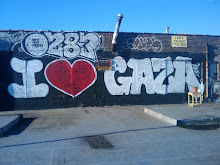I recently attended a lecture on the legalities of the war on Gaza. The moderator actually began by commenting on how, from a legal view, the title "Understanding the War on Gaza" was contentious. That one mischievous little preposition, "on", opened up a Pandora's box of legal questions-- was the war ON Gaza? not IN Gaza? What legal implications are there that it was not an INTERnational war (in that it was not between two legally recognized nations)? Does this have implications for International Humanitarian Law (not really, was the consensus) What responsibilities does Israel hold as the Occupier? Is Gaza occupied? Who was the aggressor and who was the defender? Could the two year economic blockade Israel imposes on Gaza be considered an act of war? What are the criteria of self defense? And then on legal accountabilities...what options are there for holding Israel accountable for breaches of law-- should it be found to have broken it-- since it is not a member of the International Court of Justice? How is Hamas legally regarded? Is it regarded as a collective entity recognized by international law?
I must admit, I am not well versed in law. And while I took notes, the speakers posed a series of questions and expounded upon them, but did not take positions per se (except during the question/answer). With Israel/Palestine, there are many grey areas, and legally-- apparently-- it is a singular situation, and thus there is not a standard of international/war/humanitarian/occupation laws that always apply to it. There was discussion of Palestnians' focus on the Fourth Geneva Convention, and Israel's refusal to recognize it. Interestingly, one panelist relayed an annecdote from a SOAS colleague who every year has his students engage in a role playing activity. And he said that everytime he does this, whatever real-life politics those playing Palestinians hold, the "Palestinians" always rely on international law to make their arguments-- that invariably they find that legally, they are being wronged and have a case. Students who, in real life, may support Israel's expansionist policies and illegal activities-- when forced to see Israel through Palestinians' eyes--argue that its actions contradict international laws.
Much of the talk revolved around the legalities of "targetting" civilians, and the grey areas around that (a civilian may be targetted if he/she is directly participating in hostilities against the enemy, but only during the action of direct hostilities, i.e. if James had in the past directly participated in said hostilities, he cannot be targetted today for past actions, unless right at the moment of targetting he is directly participating in hostilities. That is my understanding) In response, a dear friend of mine stood up during questions and asked, "How can we begin to talk about 'targetting' when Israel is dropping one and two ton bombs into residential areas-- because ALL of Gaza is residential. How do they think they are NOT targetting civilians? With all the escape routes open to the people of Gaza (sarcasm), how can Israel not be held accountable for targetting civilians?" He received a thunderous round of applause from the audience, and an immediate shut down by one of the panelists that his argument held "0 in terms of legality".
I left the panel wondering if laws are created and upheld to issue justice to those whose rights have been violated, or to protect through "technicalities" and issues of "grey" those who execute violations. Rashid Khalidi presented the collective,mass criminalization of Palestinians as "breathing while Palestinian" (a pun off of the American saying "driving while black" that illustrates the non-Black's immediats assumption that if a Black person is driving in a White neighborhood he/she must be engaging in some criminal activity). That just breathing qualifies you as engaging in hostile activities, if you are Palestinian.
So do we try to revamp international law or work within its confines, as Israel continues to enjoy impunity from its actions, based on "technicalities" and "grey" areas? For Palestinians, it sadly seems they will be singing "I fought the law, and the law won" for quite a while without some way to hold Israel accountable for its actions. Do morality and law really not mix? in all the talk of the Law of War...where is the Law of Justice?
Friday, January 30, 2009
Subscribe to:
Post Comments (Atom)



No comments:
Post a Comment